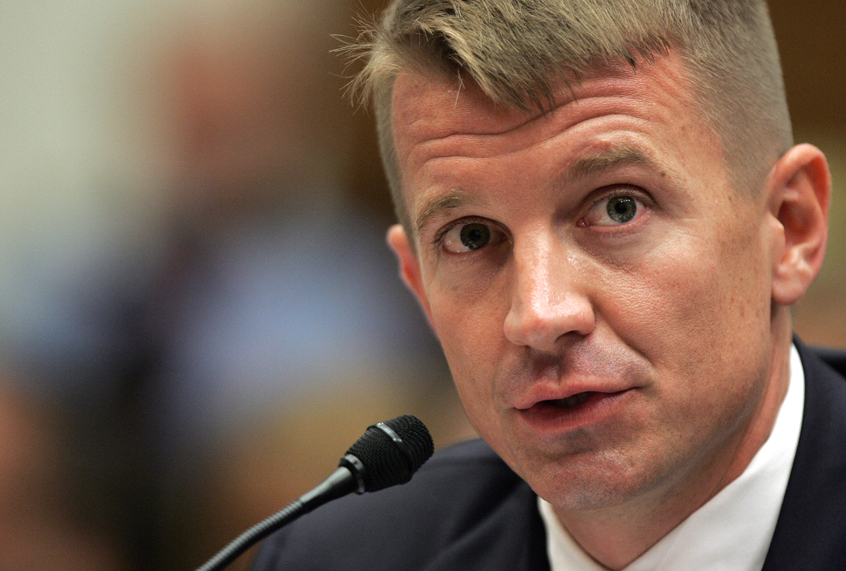Blackwater founder Erik Prince helped fund former Trump adviser Michael Flynn’s effort to find Hillary Clinton’s deleted emails and lied to congressional investigators about his meeting with a Russian oligarch in the Seychelles, according to special counsel Robert Mueller’s final report.
According to the partially redacted report, Flynn enlisted Republican activist Peter Smith and Barbara Ledeen, a longtime aide to Iowa Sen. Chuck Grassley, to track down the deleted emails. The move came after Trump said in July 2016 that he hopes Russia would “find the 30,000 emails that are missing” and repeatedly asked campaign associates to help track them down.
“Ledeen claimed to have obtained a trove of emails (from what she described as the ‘dark web’) that purported to be the deleted Clinton emails. Ledeen wanted to authenticate the emails and solicited contributions to fund that effort. Erik Prince provided funding to hire a tech advisor to ascertain the authenticity of the emails,” the report said, adding that the emails ultimately proved to be “not authentic.”
Prince, the brother of Education Secretary Betsy DeVos, was an unofficial adviser to the Trump campaign throughout 2016. After Trump’s election, he traveled to the Seychelles in January 2017 to meet with Kirill Dmitriev, who ran one of Russia’s sovereign wealth funds.
Prince claimed in November 2017 to the House Intelligence Committee that he coincidentally happened to meet Dmitriev while on a business trip and was not acting as a conduit for the Trump campaign.
“I didn’t fly there to meet any Russian guy,” Prince told the committee.
But the Mueller report shows that Prince lied to Congress.
Dmitriev enlisted the help of George Nader, an adviser to the United Arab Emirates crown prince, to introduce him to Trump transition team officials and Nader then arranged the meeting in the Seychelles, the report says.
Nader met with Prince in New York ahead of the meeting to discuss Dmitriev, according to Mueller. Nader told Prince that the Russians were “looking to build a link with the incoming Trump administration” and showed him Dmitriev’s Wikipedia entry. Nader later forwarded documents from Dmitriev to Prince ahead of the meeting.
“Dmitriev was not enthusiastic about the idea of meeting with Prince, and Nader assured him that Prince wielded influence with the incoming administration,” the report said.
Prince, Nader wrote to Dmitriev, “is designated by Steve [Bannon] to meet you! I know him and he is very, very well connected and trusted by the New Team. His sister is now a Minister of Education.”
“According to Nader, Prince had led him to believe that Bannon was aware of Prince’s upcoming meeting with Dmitriev, and Prince acknowledged that it was fair for Nader to think that Prince would pass information on to the Transition Team,” the report said.
During the meeting, Prince and Dmitriev discussed U.S.-Russia relations, according to Mueller, and Prince promised to bring up the issues with Bannon.
Prince told Mueller’s team that he briefed Bannon on the meeting but Bannon told Mueller’s investigators that “he never discussed with Prince anything regarding Dmitriev.”
“Bannon also stated that had Prince mentioned such a meeting, Bannon would have remembered it, and Bannon would have objected to such a meeting having taken place,” the report said. “The conflicting accounts provided by Bannon and Prince could not be independently clarified by reviewing their communications, because neither one was able to produce any of the messages they exchanged in the time period surrounding the Seychelles meeting.”
In what a reasonable observer might conclude was not a coincidence, both Bannon and Prince’s personal phones appeared to have had numerous relevant messages expunged. “Prince’s phone contained no text messages prior to March 2017, though provider records indicate that he and Bannon exchanged dozens of messages,” Mueller reports. “Prince denied deleting any messages but claimed he did not know why there were no messages on his device before March 2017. Bannon’s devices similarly contained no messages in the relevant time period, and Bannon also stated he did not know why messages did not appear on his device.”

